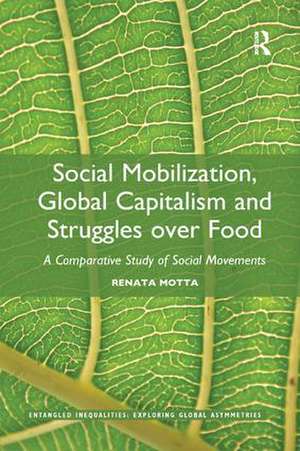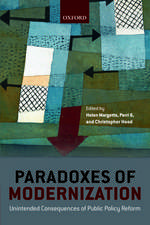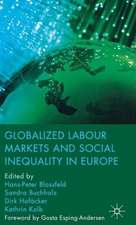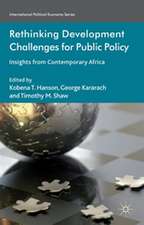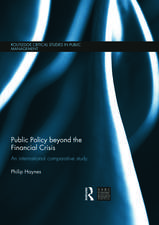Social Mobilization, Global Capitalism and Struggles over Food: A Comparative Study of Social Movements: Entangled Inequalities: Exploring Global Asymmetries
Autor Renata Mottaen Limba Engleză Paperback – 14 aug 2018
| Toate formatele și edițiile | Preț | Express |
|---|---|---|
| Paperback (1) | 297.99 lei 43-57 zile | |
| Taylor & Francis – 14 aug 2018 | 297.99 lei 43-57 zile | |
| Hardback (1) | 819.90 lei 43-57 zile | |
| Taylor & Francis – 13 mai 2016 | 819.90 lei 43-57 zile |
Preț: 297.99 lei
Preț vechi: 355.88 lei
-16% Nou
Puncte Express: 447
Preț estimativ în valută:
57.04€ • 61.98$ • 47.94£
57.04€ • 61.98$ • 47.94£
Carte tipărită la comandă
Livrare economică 21 aprilie-05 mai
Preluare comenzi: 021 569.72.76
Specificații
ISBN-13: 9781138358799
ISBN-10: 1138358797
Pagini: 204
Ilustrații: 10 Line drawings, black and white; 4 Tables, black and white
Dimensiuni: 156 x 234 x 22 mm
Greutate: 0.38 kg
Ediția:1
Editura: Taylor & Francis
Colecția Routledge
Seria Entangled Inequalities: Exploring Global Asymmetries
Locul publicării:Oxford, United Kingdom
ISBN-10: 1138358797
Pagini: 204
Ilustrații: 10 Line drawings, black and white; 4 Tables, black and white
Dimensiuni: 156 x 234 x 22 mm
Greutate: 0.38 kg
Ediția:1
Editura: Taylor & Francis
Colecția Routledge
Seria Entangled Inequalities: Exploring Global Asymmetries
Locul publicării:Oxford, United Kingdom
Cuprins
Introduction
1. Theorizing and research disputes over GMOs;
2. A silenced revolution (1996-2002); Increasing noise (2003-2013)
3. The unexpectedly contentious Brazilians (1996-2002)
4. The politics of faits accomplis (2003-2013)
5. Many tales of GMOs: a comparison
6. Conclusions
Appendix
References
Index
1. Theorizing and research disputes over GMOs;
2. A silenced revolution (1996-2002); Increasing noise (2003-2013)
3. The unexpectedly contentious Brazilians (1996-2002)
4. The politics of faits accomplis (2003-2013)
5. Many tales of GMOs: a comparison
6. Conclusions
Appendix
References
Index
Notă biografică
Renata Motta is Assistant Professor of Sociology at the Institute for Latin American Studies at the Freie Universität Berlin, Germany.
Recenzii
'Motta’s book offers a comparatively nuanced analysis of the construction of ‘bio-hegemony’ in Argentina and Brazil, as GM crops are instituted. These case studies establish the fundamental importance of countermovement alliances as democratic registers, especially in politicizing hegemonic claims of the superiority of transgenic technology, and they offer a rich primer on the ecology of social and political contention.'
Philip McMichael, Cornell University, USA and author of Food Regimes and Agrarian Questions (2013)
'Biotechnology does not rule by itself. As this book shows, social and political struggles and confrontations at the local, national, and global level are involved in the introduction and expansion of genetically modified crops in Brazil and Argentina. The dense and rich analysis of social movements and actors presented will become a model for the analysis of movements that challenge global capitalist developments.'
Elizabeth Jelin, Senior Researcher CIS CONICET-IDES, Buenos Aires.
Philip McMichael, Cornell University, USA and author of Food Regimes and Agrarian Questions (2013)
'Biotechnology does not rule by itself. As this book shows, social and political struggles and confrontations at the local, national, and global level are involved in the introduction and expansion of genetically modified crops in Brazil and Argentina. The dense and rich analysis of social movements and actors presented will become a model for the analysis of movements that challenge global capitalist developments.'
Elizabeth Jelin, Senior Researcher CIS CONICET-IDES, Buenos Aires.
Descriere
This book explores the transformation of Brazil and Argentina into two of the world’s largest producers of genetically modified (GM) crops.The author reveals that this transformation cannot be explained by superiority of biotechnology. Rather, it is the result of political struggles whereby social movements and the rural poor are silenced, ignored, or demobilized.
Using interviews and media material, these struggles are used add to debates on agrarian futures, and illustrate challenges faced by contemporary democracies. It will appeal to scholars of sociology, political science and geography with interests in social movements, development, globalisation, inequality and political economy.
Using interviews and media material, these struggles are used add to debates on agrarian futures, and illustrate challenges faced by contemporary democracies. It will appeal to scholars of sociology, political science and geography with interests in social movements, development, globalisation, inequality and political economy.
